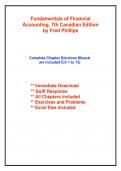Exam (elaborations)
Solutions for Fundamentals of Financial Accounting, 7th Canadian Edition Phillips (All Chapters included)
Complete Solutions Manual for Fundamentals of Financial Accounting, 7th Canadian Edition by Fred Phillips,Robert Libby,Patricia A. Libby,Brandy Mackintosh ; ISBN13: 9781264836147. (Full Chapters included Chapter 1 to 13)....CHAPTER 1 Business Decisions and Financial Accounting CHAPTER 2 The Balanc...
[Show more]



